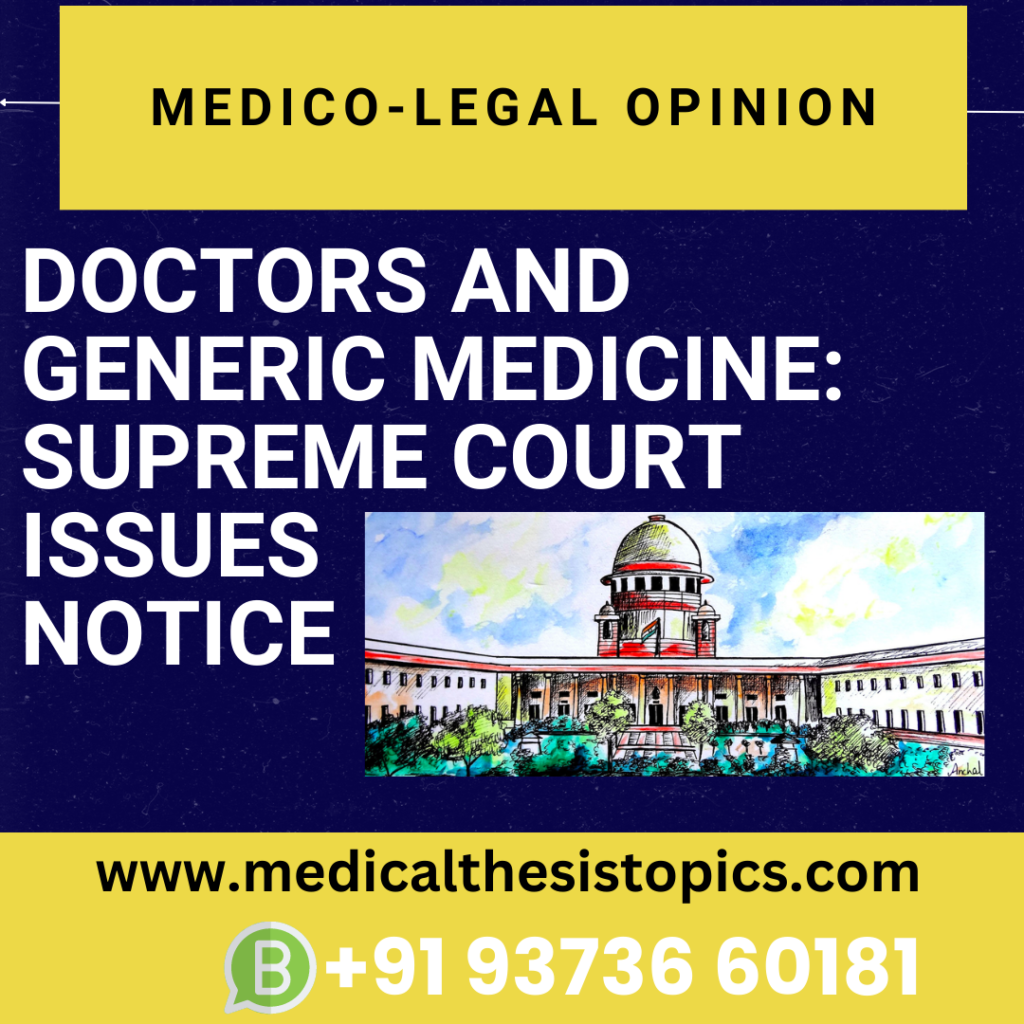Doctors and Prescription of Generic Drugs.

Supreme court seeks response on plea for disciplinary action against doctors not prescribing generic medicine .
In a significant move aimed at enhancing accessibility and affordability of healthcare, the Supreme Court of India has issued notices to the Centre, states/UTs, and the National Medical Commission (NMC) in response to a plea seeking disciplinary action against doctors who do not prescribe generic medicines. The bench, led by Chief Justice of India D.Y. Chandrachud, is taking up the matter based on a petition filed by advocate Kishan Chand Jain. The petitioner has raised concerns that despite existing regulations mandating the prescription of generic drugs, doctors continue to promote costly branded medications.
The petition draws attention to The Indian Medical Council (Professional Conduct, Etiquette, and Ethics) Regulations of 2002, which unequivocally stipulate that doctors are to prescribe only generic medicines. However, the petitioner alleges that many medical professionals still favor expensive branded alternatives, contrary to the spirit of these regulations.
The petitioner highlights a crucial aspect of this matter: the substantial price discrepancy between generic medicines and their branded counterparts. Generic medicines, typically without patent protection, can cost 50 to 90 per cent less than branded drugs, making them a more accessible option for a wider cross-section of the population.
The petitioner’s plea emphasizes the importance of implementing regulations that encourage the use of generic names for drugs. The appeal, represented by advocate E.C. Agrawala, underlines the necessity for doctors to prescribe medications solely by their generic names as per the 2002 regulations.
The Supreme Court bench, comprised of Chief Justice D.Y. Chandrachud, Justices J.B. Pardiwala, and Manoj Misra, has issued notices regarding a Public Interest Litigation (PIL) that calls for disciplinary actions against doctors who fail to adhere to the prescription of generic medicines. The notice requests responses from various stakeholders including the Centre, state governments, the Ethics and Medical Registration Board (formerly the Medical Council of India), and others involved in the healthcare system.
Advocate K.C. Jain, the petitioner, apprised the bench of the current scenario, noting that the regulations regarding the importance of generic medicine prescriptions, established in 2002, remain largely unimplemented in practice. He highlighted that the Indian Medical Council’s regulations, which underscore the significance of prescribing medicines by their generic names, are currently confined to legal frameworks and have not translated into widespread medical practice.
The plea underscores that affordability of medicines is pivotal for effective healthcare delivery and the realization of the ‘right to health’. Generic drugs, despite containing the same active ingredients as branded medicines, do not carry specific brand names, resulting in significantly lower costs. The petitioner’s plea calls for the National Pharmaceuticals Pricing Authority to set Maximum Retail Prices (MRP) for non-scheduled formulations and off-patented generic medicines.
The appeal concludes by highlighting that prescribing generic drugs can alleviate financial burdens on patients, facilitating their access to vital medications. As the Supreme Court takes up this PIL, the outcome could have far-reaching implications for healthcare accessibility and affordability in India.
However from the perspective of doctors, there is recognition of the importance of affordable healthcare and the role generic medicines play in achieving it. However, they also point out that in certain cases, branded drugs may be more appropriate due to specific patient needs, varying drug formulations, or concerns regarding generic drug quality and consistency. Striking a balance between cost-effectiveness and patient well-being remains a challenge for medical practitioners.



















